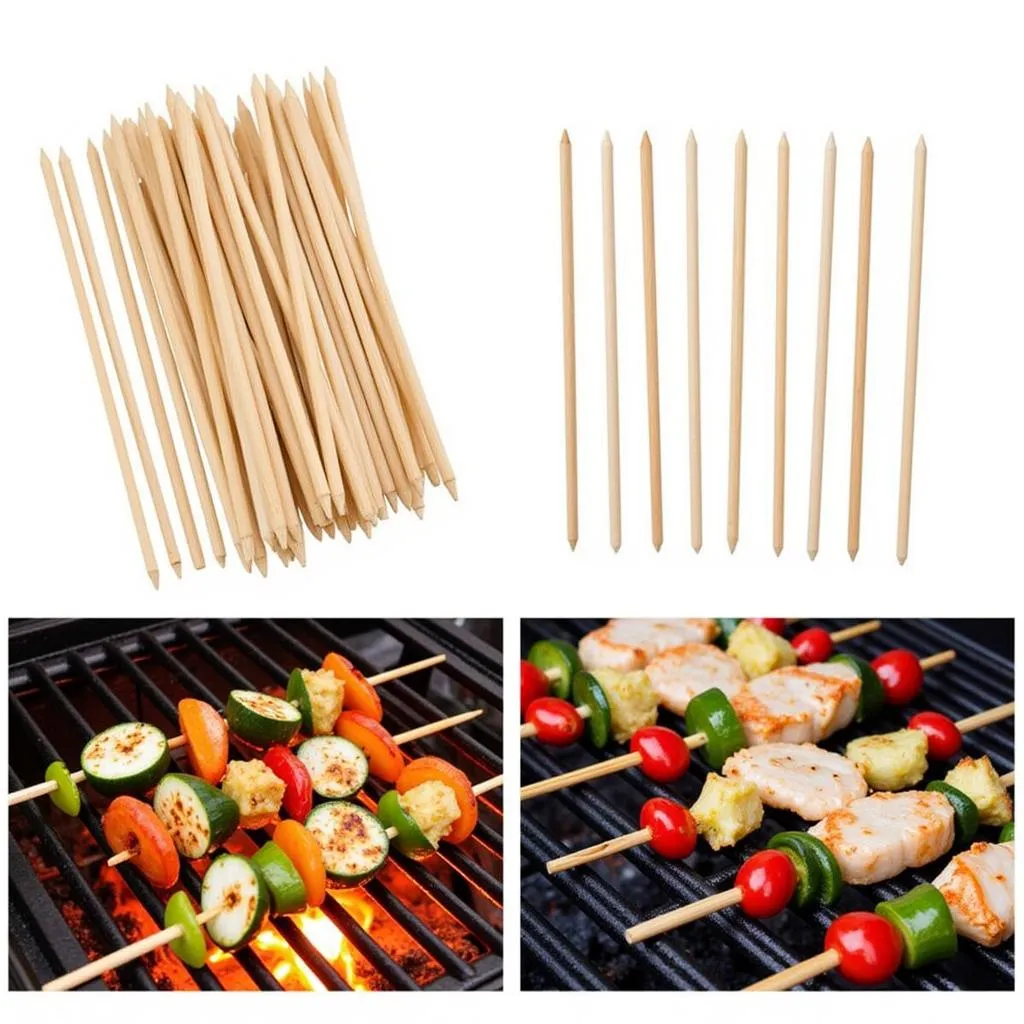Bamboo sticks are a versatile and sustainable alternative to traditional utensils for food, becoming increasingly popular for both personal and commercial use. They offer a unique blend of natural appeal, environmental friendliness, and practicality, making them a perfect choice for various culinary applications. This article delves into the fascinating world of Bamboo Sticks For Food, exploring their benefits, uses, and considerations for incorporating them into your dining experience.
The Rise of Bamboo Sticks for Food
Bamboo sticks are not just a trend but a sustainable solution to address the growing concerns about plastic pollution. Their natural origin and biodegradability make them a perfect choice for environmentally conscious consumers. As awareness about the environmental impact of single-use plastics increases, bamboo sticks offer a compelling alternative that aligns with sustainable practices.
Benefits of Bamboo Sticks for Food
1. Eco-Friendly and Biodegradable
One of the most significant advantages of bamboo sticks is their environmental friendliness. Unlike plastic utensils, which can take hundreds of years to decompose, bamboo is a naturally renewable resource that decomposes quickly, leaving minimal environmental impact.
2. Durable and Strong
Bamboo is known for its remarkable strength and durability. When treated and processed correctly, bamboo sticks can withstand significant pressure and heat, making them suitable for a wide range of foods.
3. Versatile and Multi-Purpose
Bamboo sticks are not limited to a single purpose. They can be used for various culinary applications, including:
- Skewers: Bamboo skewers are perfect for grilling vegetables, meats, and seafood, adding a rustic touch to your culinary creations.
- Stirring Sticks: Their smooth surface and resistance to heat make them ideal for stirring drinks, coffee, or cocktails.
- Snack Sticks: Perfect for serving small appetizers, snacks, or finger foods in a stylish and eco-friendly way.
- Decorative Elements: Their natural beauty and versatility allow them to be used as decorative elements in food presentations, adding a touch of elegance.
4. Natural and Safe
Bamboo is naturally antibacterial and resistant to moisture, making it a safe and hygienic choice for food contact. Unlike plastic, bamboo doesn’t leach harmful chemicals into your food.
Choosing the Right Bamboo Sticks for Food
When selecting bamboo sticks for food, several factors are essential to consider:
- Size and Thickness: Choose sticks appropriate for the type of food you’ll be using them for. Thicker sticks are suitable for grilling and kebabs, while thinner sticks are ideal for stirring drinks or holding snacks.
- Quality and Durability: Look for bamboo sticks from reputable manufacturers that have undergone proper processing and treatment for durability and safety.
- Sustainable Practices: Opt for sticks from suppliers that emphasize sustainability and ethical sourcing practices.
How to Care for Bamboo Sticks
Proper care can ensure that your bamboo sticks remain in top condition for a long time.
- Hand Washing: While some bamboo sticks might be dishwasher safe, it’s best to hand wash them with mild soap and water for optimal longevity.
- Drying: Ensure they are thoroughly dried after washing to prevent mold or mildew growth.
- Storage: Store them in a dry and airy place to prevent warping or cracking.
Bamboo Sticks in the Culinary World
Bamboo sticks have become increasingly popular in the culinary world, finding their place in both home kitchens and professional kitchens. They are a staple in many restaurants and food businesses, contributing to the growing trend towards sustainability and eco-consciousness.
“Bamboo sticks add a touch of natural beauty and rustic charm to any dish, while also reflecting the growing importance of environmental responsibility in the food industry,” says Chef Anna Garcia, a renowned culinary expert.
Bamboo Sticks: A Sustainable and Delicious Choice
Bamboo sticks offer a unique and versatile way to enhance your dining experience while minimizing your environmental impact. Their natural appeal, durability, and sustainability make them a perfect choice for anyone seeking environmentally conscious and practical solutions for everyday use. Whether you are a seasoned chef or an aspiring home cook, embracing bamboo sticks is a step towards a more sustainable and delicious future.
FAQs
Q1: Are bamboo sticks safe to use for food?
A1: Yes, bamboo sticks are generally safe for food contact. They are naturally antibacterial and don’t leach harmful chemicals. However, it’s important to choose sticks from reputable suppliers who have undergone proper processing and treatment.
Q2: How long do bamboo sticks last?
A2: With proper care, bamboo sticks can last for a long time. Hand washing and storing them in a dry and airy place can extend their lifespan.
Q3: Can bamboo sticks be used for cooking?
A3: Yes, bamboo sticks are often used for cooking, especially for grilling and skewers. They can withstand high temperatures and add a unique flavor to your dishes.
Q4: What are the environmental benefits of using bamboo sticks?
A4: Bamboo is a naturally renewable resource that grows quickly, making it a more sustainable option than plastic utensils. Bamboo decomposes quickly, leaving minimal environmental impact.
Q5: Where can I buy bamboo sticks for food?
A5: You can find bamboo sticks for food at various online retailers and supermarkets.
Q6: How do I dispose of bamboo sticks after use?
A6: Bamboo sticks are biodegradable and can be composted or disposed of in your regular trash.
 Bamboo skewers for grilling and barbeque
Bamboo skewers for grilling and barbeque
 Bamboo sticks for stirring drinks and coffee
Bamboo sticks for stirring drinks and coffee
 Bamboo sticks for serving snacks and appetizers
Bamboo sticks for serving snacks and appetizers
If you have any further questions or need assistance with finding the perfect bamboo sticks for your needs, don’t hesitate to contact us. We are happy to help you make a sustainable and delicious choice!
Contact Us:
Phone: 02437655121
Email: minacones@gmail.com
Address: 3PGH+8R9, ĐT70A, thôn Trung, Bắc Từ Liêm, Hà Nội, Việt Nam.
We are available 24/7 to assist you with any questions or concerns.